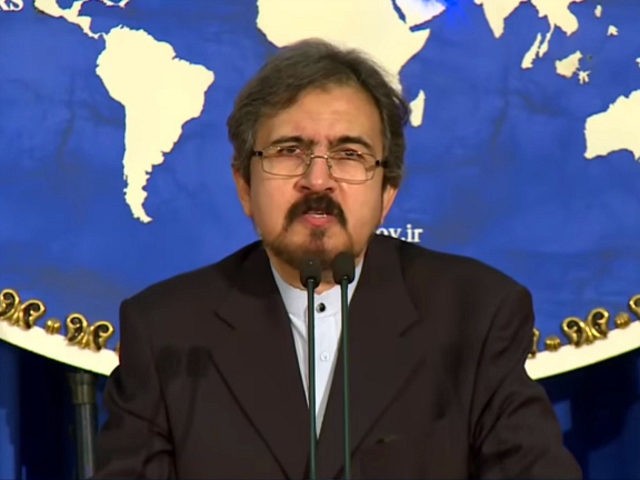On Monday, Iran responded to President Trump’s tour of the Middle East and anti-terrorism speech in Riyadh, Saudi Arabia, by accusing the United States of “Iranophobia.” Iran also said the U.S. was arming “dangerous terrorists” by selling weapons to Saudi Arabia.
Iran’s ire was raised when President Trump referred to it as “a regime that is responsible for so much instability in the region” in his Riyadh speech. Trump had already elevated Tehran’s ire by speaking from Saudi Arabia, Iran’s regional archrival across the great Shia-Sunni divide.
Trump had quite a bit to say about Iran from Riyadh:
From Lebanon to Iraq to Yemen, Iran funds, arms, and trains terrorists, militias, and other extremist groups that spread destruction and chaos across the region. For decades, Iran has fueled the fires of sectarian conflict and terror.
It is a government that speaks openly of mass murder, vowing the destruction of Israel, death to America, and ruin for many leaders and nations in this room.
Among Iran’s most tragic and destabilizing interventions have been in Syria. Bolstered by Iran, Assad has committed unspeakable crimes, and the United States has taken firm action in response to the use of banned chemical weapons by the Assad Regime — launching 59 tomahawk missiles at the Syrian air base from where that murderous attack originated.
Responsible nations must work together to end the humanitarian crisis in Syria, eradicate ISIS, and restore stability to the region. The Iranian regime’s longest-suffering victims are its own people. Iran has a rich history and culture, but the people of Iran have endured hardship and despair under their leaders’ reckless pursuit of conflict and terror.
Until the Iranian regime is willing to be a partner for peace, all nations of conscience must work together to isolate Iran, deny it funding for terrorism, and pray for the day when the Iranian people have the just and righteous government they deserve.
Also contributing to Iran’s ill humor was its recent presidential campaign, in which “moderate” President Hassan Rouhani fended off challenges from several “hardline” opponents, some with strong ties to the theocratic sector of Iranian government and culture. The Iranian nuclear deal, which Rouhani supported, was a major point of contention in the election, with critics saying the deal has not delivered the expected economic benefits to Iran.
On Monday, Iranian Foreign Ministry spokesman Bahram Qassemi accused the United States of “warmongering, meddling, Iranophobia and sales of dangerous and useless weapons to the main sponsors of terrorism.”
“Unfortunately, under the hostile and aggressive policies of the American statesmen, we are witnessing a renewed strengthening of terrorist groups in the region and miscalculation of the dictatorships which support these groups,” said Qassemi.
“Once again, by his meddling, repetitive and baseless claims about Iran, the American president tried to encourage the countries of the region to purchase more arms by spreading Iranophobia,” he charged. Over the weekend, President Trump and Saudi King Salman signed an arms deal worth about $450 billion over the next ten years.
He accused the United States of complicity in “the massacre of the defenseless Yemeni people” by Saudi Arabia and its allies and of “creating and cultivating” terrorist groups like the Islamic State and al-Qaeda, specifically naming al-Qaeda’s Nusra Front in Syria. Iran has been helping the Syrian dictatorship defeat a long and bloody insurrection in which ISIS and al-Qaeda have been significant opposition military forces.
Qassemi threw in a little anti-Israel rhetoric for good measure: “It is surprising that Iran is being accused of destabilizing the region by a country which has been an accomplice to the Zionist regime’s crackdown on the oppressed Palestinian nation through all-out arms, financial and intelligence support for decades.”
In a clever touch, Qassemi played up the tensions between some Sunni regimes and their populations by accusing them of spending too much of the public treasury on unreliable support from the United States.
“Regional countries, instead of spending billions of dollars from their people’s assets on an illusory American support, had better think about the real stability, welfare, tranquility, and peace of their people and spend these exorbitant sums on development and constructive regional cooperation,” he said.
He stressed that Iran is a “democratic, stable and powerful country enjoying popular support,” and claimed it is a “harbinger of peace, tranquility and good neighborliness in the region and a front-runner in the global fight against violence and extremism.”

COMMENTS
Please let us know if you're having issues with commenting.